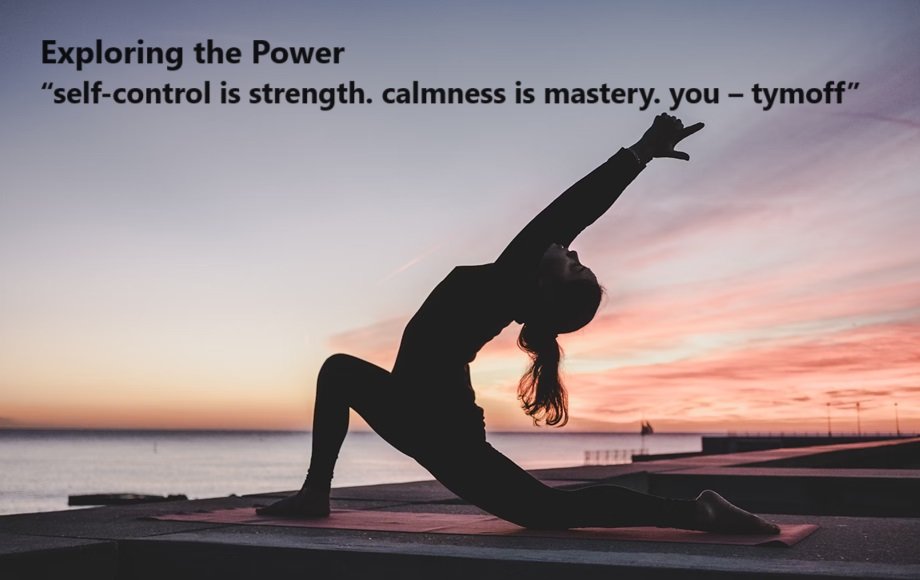In the quest for personal growth and success, two virtues stand as essential pillars: self-control and calmness. These attributes are encapsulated in the powerful phrase, “self-control is strength. calmness is mastery. you – tymoff.” This saying highlights the significant impact of these qualities on our journey towards achieving our goals and leading a balanced, empowered life.
Understanding self-control is strength. calmness is mastery. you – tymoff
Self-control is the ability to regulate one’s thoughts, emotions, and behaviors in the face of temptations and impulses. It involves making thoughtful decisions and delaying immediate gratification for long-term benefits. People with strong self-control tend to be more successful in their personal and professional lives because they can make better choices that align with their long-term goals.
Self-control is often misunderstood as merely suppressing or denying emotions or impulses. Instead, it involves being aware of them and managing them through deliberate actions. Key traits associated with self-control include self-awareness, willpower, and mindfulness. These traits empower individuals to overcome challenges, manage stress, and achieve their objectives. Moreover, self-control fosters resilience and adaptability, enabling people to navigate life’s obstacles more effectively.
The Power of Calmness

Calmness is a state of inner peace and tranquility, free from stress, anxiety, or restlessness. When individuals maintain calmness, they exhibit increased productivity, creativity, and focus. In their interactions with others, they display greater tolerance, compassion, and empathy.
Cultivating calmness requires more than just determination or effort; it involves nurturing a mindset that promotes peace through self-awareness, mindfulness, and relaxation techniques. By focusing on the present moment and letting go of negative thoughts, emotions, and impulses, individuals can achieve a state of calmness that enhances their overall well-being.
Calmness also plays a crucial role in facilitating self-control. Individuals who remain composed are less likely to react impulsively or emotionally to external stimuli. This allows them to make deliberate decisions that align with their values and goals, free from the influence of cravings or fears. Additionally, calmness improves interpersonal relationships and fosters effective communication.
See more: Wellhealthorganic Stress Management: A Guide to Health and Wellness
The Interplay Between Self-Control and Calmness
Self-control and calmness are deeply interconnected. Self-control helps individuals maintain their composure in challenging situations, while calmness enhances their ability to exercise self-control. Together, these virtues create a powerful synergy that supports personal mastery and growth.
The Importance of Practice
Achieving mastery in any area of life requires consistent practice. Those who practice diligently and sincerely develop the skills and habits necessary to reach their goals. Setting aside daily time to focus on personal objectives and improve key skills is essential for progress.
Establishing Clear Objectives: Setting clear goals is vital for achieving mastery. Well-defined goals provide direction and purpose, guiding efforts toward tangible outcomes. Breaking long-term goals into smaller, manageable milestones prevents feelings of overwhelm and boosts motivation by offering a sense of accomplishment at each step.
Navigating Obstacles and Adversities: The journey to mastery is fraught with challenges and setbacks. While these difficulties can be discouraging, they also present invaluable opportunities for personal growth. By viewing failures as learning experiences, individuals can identify the causes of their setbacks and adapt, emerging stronger and more resilient.
The combination of self-control and calmness is essential on the path to mastery. With dedication, perseverance, and a steadfast belief in progress, individuals can navigate obstacles and achieve proficiency in their chosen pursuits.
The Role of Self-Control in Decision Making and Actions

Self-control is an essential quality that allows individuals to effectively manage their thoughts, emotions, and behaviors. It serves as a compass, guiding people toward thoughtful judgments rather than impulsive decisions. This attribute is especially important when making decisions and solving problems, as it enables individuals to thoroughly consider all options before making well-informed choices.
Regulating Actions: Self-control is crucial for managing behavior. It provides the ability to resist temptation and delay gratification. By cultivating self-control, individuals can prioritize their goals and make decisions that support their long-term objectives. For example, if someone has committed to saving money, self-control will help them resist the urge to make unnecessary purchases, allowing them to stick to their budget.
Improved Decision Making: People with strong self-control typically possess better decision-making skills. They can evaluate multiple options and consider the pros and cons before making wise choices. Self-control helps guard against impulsive decisions that might lead to regret. By exercising self-control, individuals can choose long-term goals over short-term pleasures, aligning their decisions with their core values and aspirations.
Also read: 7 Reasons Why Bakuchiol is the Future of Skincare
Practical Tips for Enhancing Self-Control and Calmness
- Practice Mindfulness: Regular mindfulness meditation can help increase self-awareness and emotional regulation, enhancing both self-control and calmness.
- Set Clear Goals: Define your long-term objectives and break them down into smaller, achievable milestones to stay focused and motivated.
- Develop a Routine: Establishing a daily routine that includes time for relaxation and reflection can help maintain a state of calmness and strengthen self-control.
- Exercise Regularly: Physical activity can reduce stress and improve mood, contributing to better emotional regulation and overall well-being.
- Seek Support: Engage with supportive friends or a mentor who can provide guidance and encouragement on your journey toward self-mastery.
Conclusion
The phrase self-control is strength. calmness is mastery. you – Tymoff serves as a beacon amidst the chaos of modern life. It highlights the profound impact of self-control and calmness on our journey toward success and personal growth.
Self-control forms the foundation of personal development by enabling us to regulate our impulses, desires, and reactions. It empowers us to withstand fleeting temptations, stay focused on our objectives, and make decisions that align with our long-term goals. Calmness, on the other hand, epitomizes mastery. By understanding and managing our emotions, we can respond to situations with poise and clarity. This equips us with the tools necessary to communicate effectively, make sound decisions, and foster healthy relationships.
In embracing these virtues, we embark on a transformative journey toward mastery and fulfillment. By practicing self-control and cultivating calmness, we can navigate the challenges of life with grace and determination, ultimately achieving our aspirations and living a balanced, powerful life.
Disclaimer
The article is only for the information purpose and the website does not want to hurt your sentiment. By integrating these concepts into your daily life, you can unlock new levels of personal growth and success. Remember, self-control is strength. calmness is mastery. you – Tymoff is more than just a phrase; it’s a guide to living a life of purpose and fulfillment.



